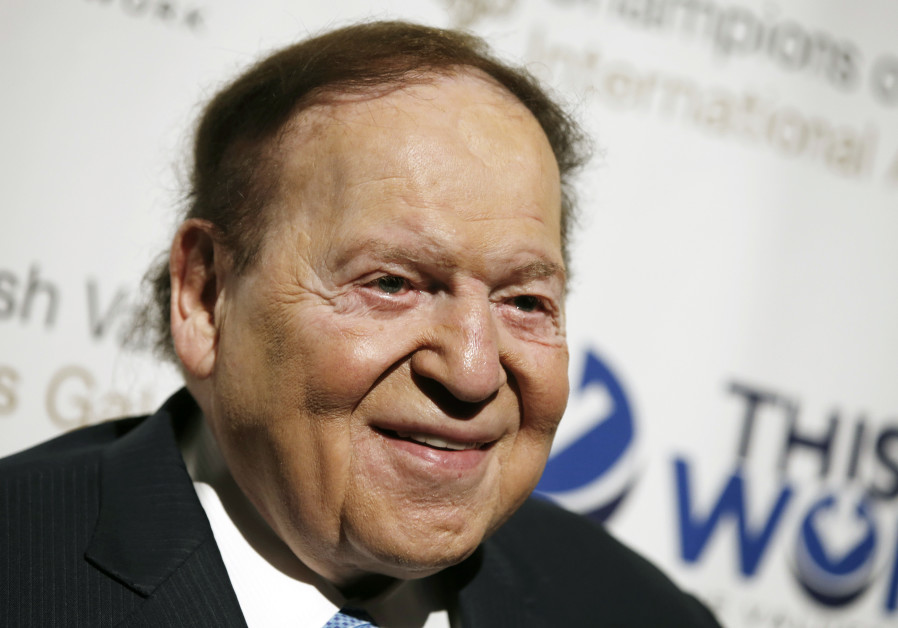 COURT RESUSCITATES PALESTINIANS’ GENOCIDE CASE AGAINST ADELSON IN US
COURT RESUSCITATES PALESTINIANS’ GENOCIDE CASE AGAINST ADELSON IN US
YONAH JEREMY BOB

A US court of appeals has resuscitated a civil damages lawsuit by a group of Palestinians claiming support for genocide against tycoon Sheldon Adelson, the Trump administration’s envoy Elliot Abrams, megachurch pastor John Hagee and a range of banks, companies and NGOs. The Palestinians claim these people and institutions are linked to the settlement enterprise and to alleged war crimes in the last three Gaza wars.
The $34.5 billion case was previously dismissed by the lower US district court for the District of Columbia based on the idea that it implicated political and foreign policy questions of which the judiciary traditionally stays out.
The appeals court’s late Tuesday decision was not close to a final victory for the plaintiffs and the case may still be dismissed before it reaches a trial. But the appeals court did say that the lower court had applied the political question doctrine too broadly and could not dismiss the case simply on those technical grounds.
There is speculation about whether the defendants will appeal to a broader panel of the US Court of Appeals for the District of Columbia, appeal to the US Supreme Court or try to beat the case on other jurisdictional grounds back at the lower court.
The allegations may present some complex challenges for the defendants. But some more sensational ones, like characterizing when Abrams’ condemned Palestinian violence before Congress or communicated with Israeli government officials as “overt acts” to “promote the settlement enterprise” which “meant the theft of… Palestinian property,” seem to be intended just to grab headlines.
The group is led by Palestinian activist Bassem Tamimi and appears to likewise include about 17 other Palestinians. The case seeks to turn the tables in US courts on Israel and financial supporters of the settlements and the Friends of the Israeli Defense Forces.
By attempting to characterize the settlement enterprise as organized crime, and the IDF as a group prone to war crimes – while completely ignoring the opposing Israeli narrative or even the likely US view on those issues – the plaintiffs seem to want to score either financial or public relations points with the lawsuit.
Some of the other prominent defendants include Bank Hapoalim, Bank Leumi, several NGOs linked to settlements, Hewlett-Packard, Motorola, the UK-based firm G4S, FIDF, Haim Saban and Irving Moskowitz.
Tamimi and his group allege four claims of conspiracy, trespassing, aiding and abetting and war crimes and abuses.
The alleged organized criminal activity they refer to is what they characterize as the violent expulsion of Palestinians from their land and the ruining of their businesses to make room for further Jewish settlements.
The Palestinians have developed a graph that they say shows how Adelson, Moskowitz, Hagee and other donors are tied to funding certain settlements and likewise have ties the establishment of those settlements, from which they claim Palestinians were forcibly expelled.
However, the original complaint lacked details such as dates and who specifically was involved, making it difficult to even begin to evaluate many of the claims.
The alleged war crimes referred to included: the alleged killing of 14 members of Doa’a Abu Amer’s family in the 2008-2009 Gaza war, the alleged beating and disabling of Ahmed al-Zeer by settlers, and a range of other alleged violent acts, including the alleged “extrajudicial” shooting of a Palestinian who tried to stab Israeli soldiers.
Besides the particular issues alleged, the playing field for the Palestinian-American lawsuits will be far different than for the Israeli-American ones at a global level.
The Israeli-American lawsuits were nearly exclusively focused on variations of wrongful death in suicide and other bombings, even as the allegations against specific defendants were for financing or providing logistical support for the attacks.
In contrast, the new Palestinian-American suit is for financing or connections to the settlement enterprise and to the IDF.
While arguing that US policy viewed the settlements as illegal, the plaintiffs tried to claim that anyone who supported the settlement enterprise also supported violence against Palestinians and the loss of land.
US policy on the settlements issue has varied from administration to administration.
According to Shurat Hadin Director Nitsana Darshan-Leitner, who has represented other defendants against similar lawsuits brought by some of the same plaintiffs, “It’s unfortunate the Court’s technical ruling rejected the political question doctrine finding and reinstated what is obviously a frivolous harassment suit brought by Palestinians affiliated with the radical groups against largely Jewish and Israeli parties.”
She added that while ultimately all these claims will eventually be tossed out, they do suck up huge amounts of time and resources, “which is the intended goal of baseless lawfare actions like this.”
Lawyer Eric Sherby, who has been a top ABA official, previously told The Jerusalem Post that there are also a range of jurisdictional issues that could blow the case out of the water on motions to dismiss, before it even gets to the details. While there are many issues, two could include a lack of standing to sue and the fact that the incidents in question occurred outside the US.
